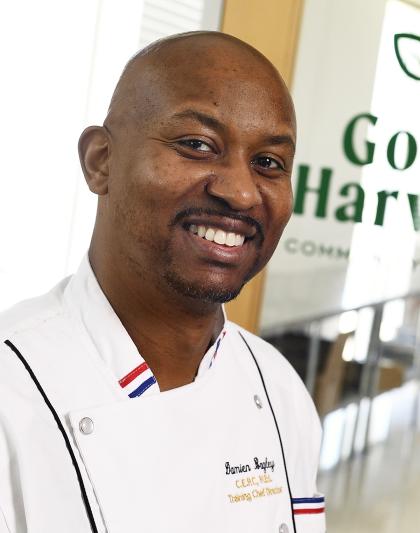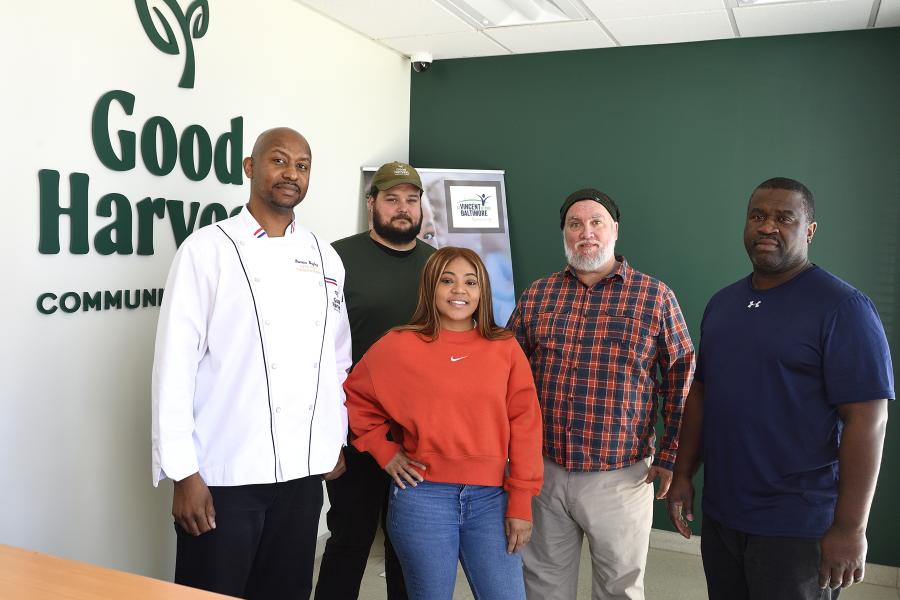Safety in the kitchen usually focuses on being careful with knives, avoiding burns on a hot pan, or properly handling and storing food.
But what if the act of being in the kitchen itself led to improved safety?
That's the premise behind the Good Harvest Food Services Training Program, which tries to attract Baltimore City residents ages 18-24 who are not in school and not working and sets them on a course toward a job in the culinary industry.
The Good Harvest program, run by St. Vincent de Paul of Baltimore, is one of nine grant recipients of the Johns Hopkins University's Innovation Fund for Community Safety. The Innovation Fund is a four-year, $6 million initiative to support community programs in Baltimore that aim to address the root causes of violence in the city.

Image caption: Damien Bagley
Image credit: Will Kirk / Johns Hopkins University
The idea, according to Shatabdi Patel, program manager for the Innovation Fund at Hopkins, is to intervene with these youth, who are at high risk of being a victim or perpetrator of violence. The program offers a different path, with training and job placement ideally leading to a food service career paying a living wage.
"When people aren't in school or aren't working, when they don't have support or something to work toward, it creates a gap," Patel said. "Something will fill that gap, good or bad. We're working to fill it with something positive."
Students go through an intensive, 12-week program with classroom instruction and hands-on kitchen experience, taught by Damien Bagley. Bagley is a Culinary Institute of America-trained chef with years of experience in Las Vegas kitchens at the Rio, the Hard Rock, and Le Cordon Bleu. He also has a master's degree in education and taught at Stratford University. It may be the perfect resume to lead this kind of course.
"A lot of students are amazed at the things that I've done," Bagley said. "I let them know that everything I have, they can have too. You can do anything you want and go as far as you want as long as you work hard and stick with it."
Bagley teaches kitchen fundamentals like food handling and storage and basic measurements and math. In the kitchen, program participants learn knife skills and a few recipes. They can leave the class with a ServSafe Food Handlers certificate and ServSafe Manager's certification. The former is required for just about any food service job, and the latter can open doors to higher-paying manager roles.
The Manager's test can be daunting. It's 90 questions and takes two hours, and Bagley says people already in the industry may not pass. "You have to know your stuff," he said.
That means attending class regularly, which can be a challenge for many students. Good Harvest provides transportation to class and a weekly stipend as an incentive to show up. Even if students get to class, many bring other baggage with them—issues at home or mental health challenges. Some need a place to live or child care.
That's part of what makes Bagley so effective.
"The students love him," said Daniella Leon, a master's candidate in JHU's Bloomberg School of Public Health and outreach coordinator at Good Harvest. "He has such a way of connecting with the students and knowing where they are coming from. That goes a long way in helping them succeed."
Leon and Hameenat Adekoya, another Bloomberg master's student and Good Harvest outreach coordinator, were hired to work on the program by Mindi Levin, associate scientist at the Bloomberg School and founder and director of the community engagement and service-learning center SOURCE. She serves as the JHU faculty lead on the Good Harvest project and facilitates academic collaborations to research and develop youth-focused interventions that complement the program.
SOURCE and Good Harvest have an ongoing partnership that predates the grant, Levin said. At SOURCE, Levin coordinates access to grad students and faculty experts to support the project.
Adekoya and Leon also teach a study skills session at the beginning of each cohort. They help the students create a filing system to stay organized.
"You can tell Damien cares about the students and setting them up for success," Adekoya said. "He understands the difficulties they are dealing with. He encourages them. We heard from one participant who failed her test the first time, but Damien's support gave her the courage she needed to retake it. The second time, she passed."
Bagley teaches students to work in the food industry, Patel noted, but he also is like their counselor or therapist. Recently, a child in Baltimore was shot and killed leaving school one afternoon. The child's brother was a Good Harvest student. Bagley knows he'll have to address more than culinary skills on any given day and support the students however he can.
"Any chef can teach you how to cook," Patel said. "Damien does more than that. He and Good Harvest provide a safe space and stability. He's a great role model for these kids."
That's what stands out most to Patel about the Good Harvest program—how committed the staff is to supporting the students. This includes teaching soft skills like interviewing or conflict resolution at work. Job placement services and employment support extend months after graduation.
Image caption: A conversation with Damien Bagley, training chef director at Good Harvest Community Kitchen
But it goes above and beyond what is part of the program, Patel said. Whatever the students need—a counselor, someone to help with anger management, mental health professionals, any kind of wraparound services—the Good Harvest team is committed to helping find it.
"I'm blown away by how much they advocate for the students," Patel said.
The results show it's working. In the last six months, 27 students graduated from the program. Adekoya recalls one who had a job at a restaurant, but after the class, was promoted to manager. Leon remembers a student who said she had to drop out of high school after getting pregnant. "She ended up having three beautiful kids, and she put them first and herself on the back burner. She entered the program to have better job prospects. It was the first time she ever graduated from anything," Leon said.
In addition:
Good Harvest resumed a partnership with Royal Farms that paused during the pandemic. In October, Royal Farms reported hiring two recent graduates and promoting one to manager. The hiring manager plans to continue bringing in Good Harvest graduates.
A January 2023 progress report noted that graduates have obtained food industry jobs ranging from $13.50 to $21 dollars per hour, including one student placed at Petit Louis Bistro restaurant in Roland Park.
Last summer, a participant who was living at the Community Wellness Center raved about the program to others at the Center. Within a week, seven of them signed up for future cohorts. The participant graduated with the highest score to-date on the ServSafe Manager's exam.
One student in 2022 came to the program amid a domestic violence situation. With encouragement from staff and the assurance of a safe space in class, the student completed the course, was placed in a job, and was able to move out of the abusive environment and gain a level of independence.
With these successes, the plan is to continue to grow.
Levin supports Adekoya and Leon in developing recruitment and retention methods. The students also help find job placement opportunities for program graduates and developed an exit survey to understand—and address—barriers to program participation.
Bagley also credits Sharease Mills, recruiting specialist for Good Harvest, with increasing the number of participants.
"We're running a good program," Bagley said. "And we definitely want to keep moving forward."
Posted in Community








